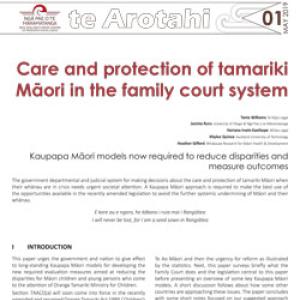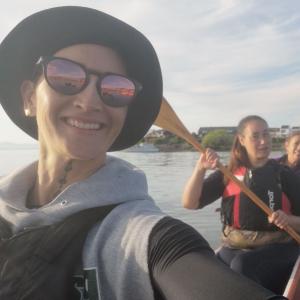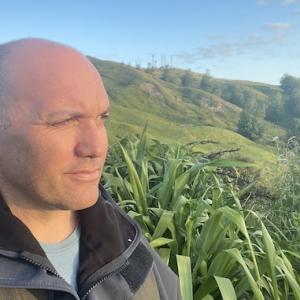Providing informed and expert Māori researched evidenced insights is central to the work of Ngā Pae o te Māramatanga (NPM), and this week NPM has launched a new series of think piece papers to provide research and focus to critical topic areas and issues facing Aotearoa New Zealand.
The first paper, Care and Protection of Tamariki Māori in the Family Court System, urges the government to give effect to long-standing Kaupapa Māori models for developing new legally-required evaluation measures aimed at reducing the disparities for Māori children and young people who come to the attention of Oranga Tamariki Ministry for Children. New law comes into force on 1 July 2019 (http://www.legislation.govt.nz/act/public/2017/0031/24.0/DLM7064559.html) that requires the Chief Executive of Oranga Tamariki to recognise and provide for a practical commitment to the Treaty of Waitangi. This includes an explicit new requirement to set measurable outcomes for Māori children and young persons. This paper, authored by Māori researchers and Māori lawyers, calls for a Kaupapa Māori approach to realise the opportunity to positively disrupt the government’s systemic undermining of Māori and their whanau.
The second article Precariat Māori Households Today - calls for significant societal and policy change to enable Māori whanau to be truly free from the cycle of employment, income and rights insecurity. The solution to poverty is not simply employment. The large team of Māori researchers and those working directly with Māori whānau in need, including the Waikato Women's Refuge and the Fairfield Community House, propose structural changes to address poverty inequality in Aotearoa. They urge the government to co-design policy with whanau, and those who work alongside them as advocates and service providers. A new inclusive approach to policy making is required.
These inaugural reports, titled the Te Arotahi series, provide Māori-researched evidence and focus on specific critical topics to support discussion, policy and positive action.
In 2018, NPM co-hosted a Wellington event with the now disestablished Superu - Toi Tū Te Whānau, Toi Tū Te Kāwai Whakapapa: A Workshop on Whānau and Whakapapa for Public Policy. This workshop brought together nearly 200 policy analysts, agencies and thought leaders to listen and engage with NPM Māori multidisciplinary researchers who are working on matters that we believe require urgent government appreciation of Māori evidenced solutions.
NPM researchers are working on the ground, every day, in developing programmes of work that are designed to respond to the unique characteristics of whānau and address the needs and aspirations of Māori throughout the country. These think piece papers were conceived after the workshop to encapsulate these Māori researched perspectives and inform the nation’s leaders on potential ways forward.
The third paper in the series, Whānau Ora and Imprisonment, will be published in August and focuses on the criminal justice system in New Zealand and the importance of whānau and whakapapa in imprisonment. Subsequent papers are being prepared as Te Arotahi becomes a firm fixture in the work of NPM.
NPM Co-Director Professor Jacinta Ruru reflected on the words of the Minister of Māori Development Hon Nanaia Mahuta, in her address at the Toi Tū Te Whānau workshop where she talked about the importance of the work being undertaken and the need for this work to find the right solutions as soon as possible.
“Minister Mahuta said that it can’t be about taking positions anymore, and that the world requires us to think differently and do things differently. This approach is at the core of the work that Ngā Pae O te Māramatanga has undertaken for the past 17 years, and is what drives us to find solutions for government and for our communities. Te Arotahi provides us with another opportunity to bring the work of Māori researchers out into the light of day, delivering policy makers with a unique opportunity to assess opportunities, identify new solutions and create new paradigms".
View the inaugural papers as ebooks and/or download from:
http://www.maramatanga.ac.nz/research/arotahi-papers

He Kōrero | Our Stories
Neuroscientist Nicole Edwards is establishing her own lab at the University of Auckland and is eager to tautoko students interested in a career in brain research.
AUT senior lecturer Deborah Heke encourages wāhine Māori to cherish their connection with te taiao.
Tairāwhiti local Manu Caddie is a vocal critic of forestry companies engaged in unsustainable land practices in the rohe. He shares his insights on what needs to change".


